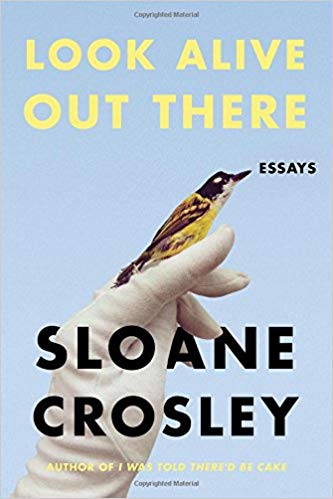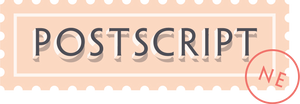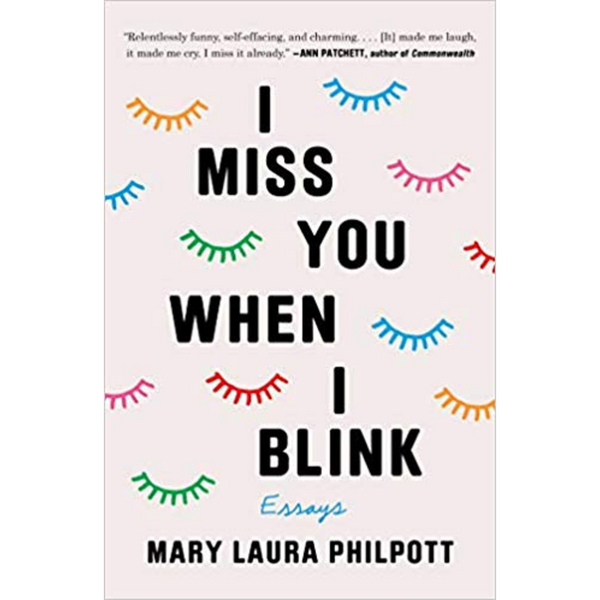Beached and Reading
13th Jun 2019
I get that the typical choice is a light and indulgent novel. Chick lit or a good mystery. Nothing heavy, nothing too intense. Just a tandem guilty pleasure that pairs well with lying around in the sun for hours in the middle of the day.
I just can’t do it, guys. I mean, I didn’t pack Marcel Proust’s In Search of Lost Time or anything, which a friend of mine from grad school once took to the beach (the thought of this struck me as absurdly funny at the time). But given that my time to read over the past couple of years has been so curtailed, I was insanely eager for more serious fare.

I finished Sloane Crosley’s Look Alive Out There, which I would highly recommend. The topics are wide-ranging and fascinating, but it’s her writing that is especially captivating. Her metaphors are surprising, her jokes enviably good. If a writer’s agility with language is important to you as a reader, this is a super satisfying choice. She seems like someone whose company I would be infinitely delighted by, and who doesn’t want to read a book by that person?

After that, I moved onto Mary Laura Philpott’s recent release, I Miss You When I Blink. When I was in graduate school, it was treated as an essential thing, among writers, to have a topic to write about that didn’t just come down to personal essays. That desire—in that context—was entry-level. Rookie. And really just discouraged. Well, I am here to report to you that this book is a series of personal essays about life’s most mundane topics: driving kids to activities, helping with school fundraisers, parenting, marriage, feeling stuck in life. Beached, let’s say.
It would not have been sanctioned, I fear, by my own writing professors. However, because our life experiences overlap in so many ways, personal essays about ordinary life remain wildly valuable—to me as a reader, at least. Philpott discusses, for instance, a season of depression which leads to a long stay in Nashville which leads to a permanent move, where she now writes and works at a bookstore. I was so enchanted by this glimpse into her world that we made Nashville our overnight stop on the drive home, and we went straight to Parnassus Books. It was indeed the dreamiest place. And knowing that here was an ordinary person doing ordinary things who only so many years ago was feeling stuck and who now works at this magical bookstore and just published a book of essays? It felt like the kind of thing I could do, too.
It also helped me to see that some hang-ups from academia are still with me. Even though I chose not to pursue academia as a career, I still felt like a failure leaving. Choosing not to apply for jobs might as well have been tantamount to being rejected by all the schools. It’s taken me some years to recognize: I still love to read. I still love to write about what I read. And I don’t need permission from any institution to do those things. I just need the desire—which I have!—and time.

Which leads me to Meaghan O’Connell’s And Then We Had Everything: On Motherhood Before I Was Ready (which I fittingly bought at Parnassus). I wrote the other week in my shop newsletter that given that my average daily radius covers all of six blocks, I can’t help but long for a life that somehow feels more expansive. And then I came across this passage toward the end:
How to explain the strange arc of parenthood to new mothers? How to tell it so that they believe you? The way things start out hard and then ease up. It is like finding more hours in the day. It is like the end of the school year, that first day of summer. It’s like you moved to a new country, and it’s beautiful but there’s a war going on. But then the war ends and you begin reconstructing yourself.
My therapist calls it expansiveness. She makes a fist, then splays her fingers out into an open palm. You expand and retract. You are on defense, and then not. You are under siege and then not. You begin to open all on your own, to seek out other people. Seek out complexity of your own. You will lie on the couch during nap time and think about opening an old cookbook and making something complicated for dinner, just because.
Reading this was a smack to the forehead. Phoebe entered our lives two years ago, and apart from knowing that I was diverting a lot of time to supporting her little existence that I had previously spent on other pursuits, I hadn’t really pinned the feeling of limitation and circumscription I’ve been feeling on her. I think because we’ve gone through this before, so it’s not supposed to be hard anymore? Especially when we had twins out of the gate? And because it’s too disconcerting to go around feeling like you’re sacrificing years of your life that you might have spent doing things you love in order to invest in a tiny human who will spend the next several years crying, kicking you, and trashing your house? (I love her so much it hurts, of course; she is her own source of boundless joy.) But this passage surprised me with its truth. The emotional challenges involved in tending to a tiny creature’s needs are hard to overstate, and it makes sense that at the tail end of Phoebe’s first two years, I would be feeling desperate for complexity and new experiences.
Reading is a good place to start. I’ve been walking again now that the weather is better. I’ve been writing my letters before the shop opens. And I’ve been showing up here to post. Bit by bit, I’ve been re-establishing routines that will help me listen to myself to determine what’s next.
The beauty of school was the script. Show up here, get your syllabus, turn in your assignments, get a grade. I can memorize a script in no time at all. Now the script is nonexistent, and I am no longer part of a community of colleagues, and I’m not even sure what goals I’m working toward apart from the nebulous ones of making a living doing what I love and offering something of value to you.
In discussing her extended stay in Nashville in the midst of a season of depression and uncertainty, Philpott recalls: “I fed the cat. I watered the plants. I watched my show about a woman taking control of her life. I walked. I read. I slept. I sat. I felt like a fist unclenching.” How odd and fortuitous that the same simile appeared in these books. And how accurate a description of how I have recently been feeling: a fist. Closed up and in tension.
But I can’t think about this metaphor without returning to Naomi Shihab Nye’s “Making a Fist,” which I first encountered in freshman English in high school and which has lodged itself in my brain ever since:
“How do you know if you are going to die?”
I begged my mother.
We had been traveling for days.
With strange confidence she answered,
“When you can no longer make a fist.”
Clenching up is a sign of life, of muscles exercising their potential. Part of the natural rhythm, really. So I’m not going to make any rash decisions; I’m just going to try to give myself some mental space I haven’t had in a while in the hopes that I’ll find myself slowly unclenching, too. And I suppose if that doesn’t work, there’s always Nashville.

